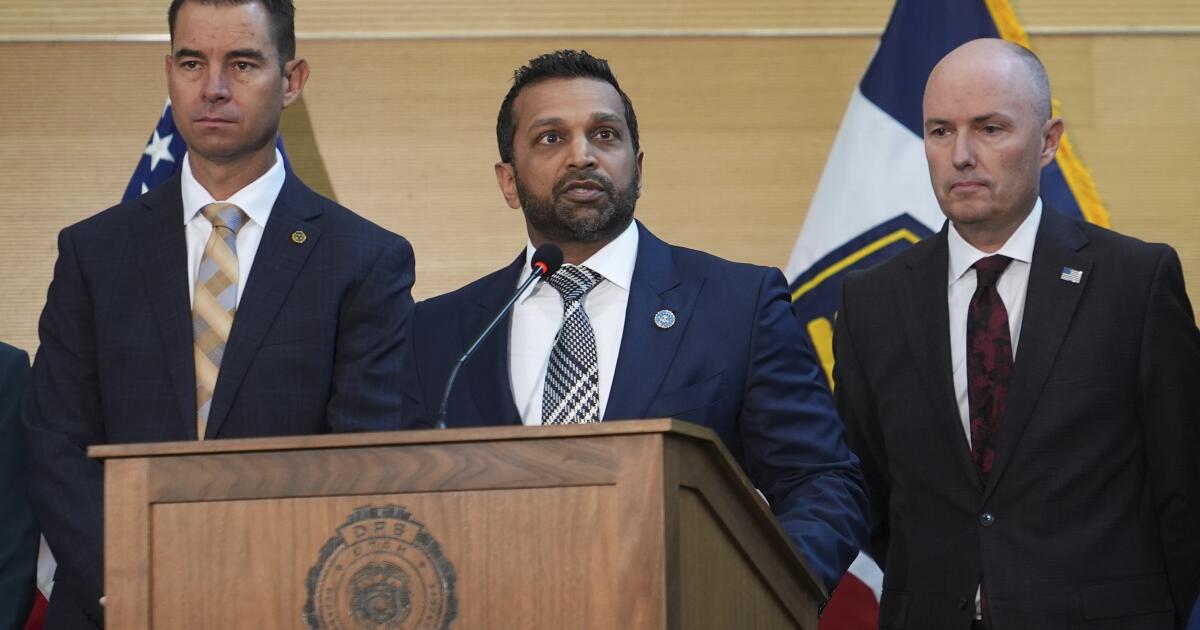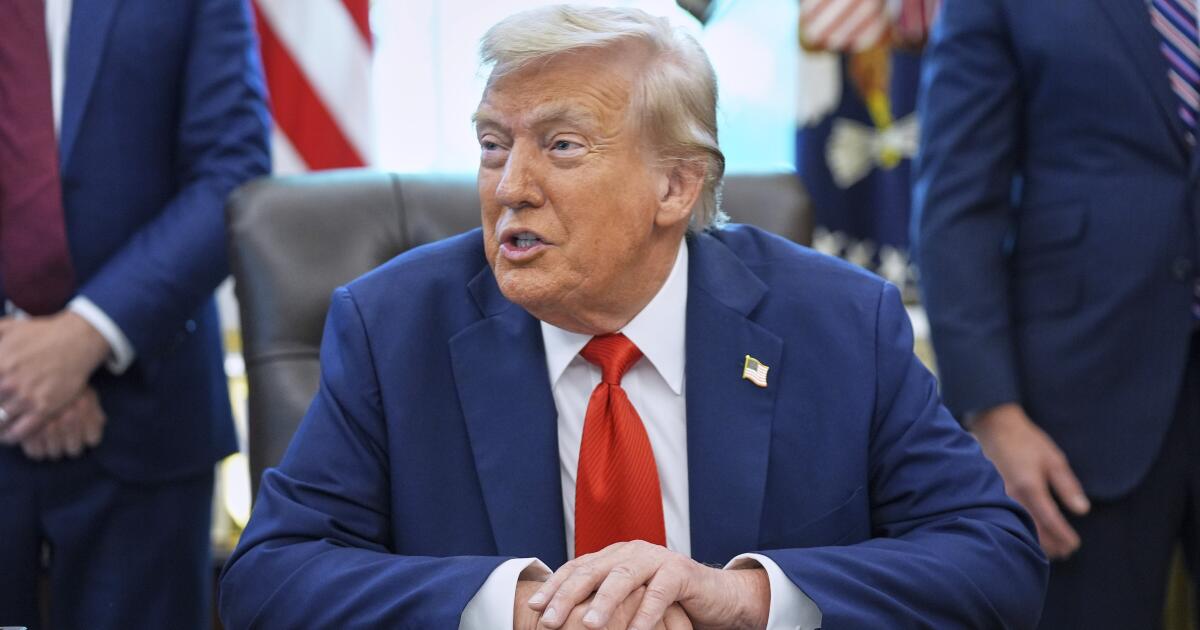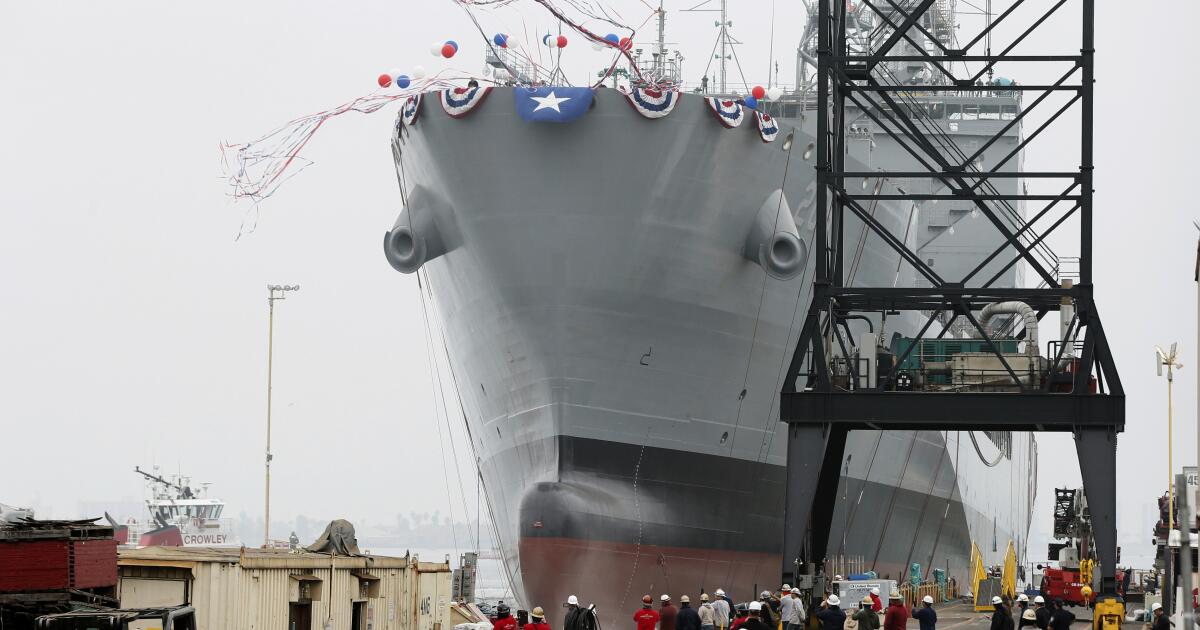FBI chief Patel faces Congress amid missteps in Kirk inquiry, agency turmoil and lawsuit over purge
WASHINGTON — Hours after the killing of conservative activist Charlie Kirk, FBI Director Kash Patel declared online that “the subject” in the killing was in custody. The shooter was not. The two men who had been detained were quickly released. Utah officials acknowledged that the gunman remained at large.
The false assurance was more than a slip. It spotlighted the high-stakes uncertainty surrounding Patel’s leadership of the bureau when its credibility is under extraordinary pressure, as is his own.
Patel now approaches congressional oversight hearings this week facing not just questions about that investigation but broader doubts about whether he can stabilize a federal law enforcement agency fragmented by political fights and internal upheaval.
Democrats are poised to press Patel on a purge of senior executives that has prompted a lawsuit, his pursuit of President Trump’s grievances over the Russia investigation long after it ended, and a realignment of resources that has prioritized illegal immigration and street crime over the FBI’s traditional pursuits.
The hearings will offer Patel his most consequential stage yet, and perhaps the clearest test of whether he can convince the country that the FBI, under his watch, can avoid compounding its mistakes in a time of political violence and deepening distrust.
“Because of the skepticism that some members of the Senate have had and still have, it’s extremely important that he perform very well at these oversight hearings” on Tuesday and Wednesday, said Gregory Brower, the FBI’s former top congressional affairs official.
The FBI declined to comment about Patel’s coming testimony.
Inaccurate claim after Kirk shooting
Kirk’s killing was always going to be a closely scrutinized investigation, not only because it was the latest burst of political violence in the U.S. but also because of Kirk’s friendships with Trump, Patel and other administration figures and allies.
While agents investigated, Patel posted on X that “the subject for the horrific shooting today that took the life of Charlie Kirk is now in custody.” Utah Gov. Spencer Cox said at a near-contemporaneous news conference that “whoever did this, we will find you,” suggesting authorities were still searching. Patel soon after posted that the person “in custody” had been released.
Two people were initially held for questioning in the case, but neither was a suspect.
As the search stretched on, Patel angrily vented to FBI personnel Thursday about what he perceived as a failure to keep him informed, including that he was not quickly shown a photograph of the suspected shooter. That’s according to people familiar with the matter who were not authorized to discuss it by name and spoke on condition of anonymity to the Associated Press. The New York Times earlier reported details of the call.
Asked about the scrutiny of Patel’s performance, the FBI said it had worked with local law enforcement to bring the suspect, Tyler Robinson, to justice and “will continue to be transparent.”
Patel’s overall response did not go unnoticed in conservative circles. One prominent GOP strategist, Christopher Rufo, posted that it was “time for Republicans to assess whether Kash Patel is the right man to run the FBI.”
FBI personnel purge
On the same day Kirk was killed, Patel also faced a lawsuit from three FBI senior executives fired in an August purge that they characterized as a Trump administration retribution campaign.
Among them was Brian Driscoll, who as acting FBI director in the early days of the administration resisted Justice Department demands for names of agents who investigated the Jan. 6, 2021, riot at the Capitol. Driscoll alleged in the lawsuit that he was let go after he challenged the leadership’s desire to terminate an FBI pilot who had been wrongly identified on social media as having been part of the FBI search for classified documents at Trump’s Mar-a-Lago estate. Trump, while out of office, was indicted for his role in Jan. 6 and the classified documents case.
The upheaval continues a trend that began before Patel took over, when more than a half-dozen senior executives were forced out under a Justice Department rationale that they could not be “trusted” to implement Trump’s agenda.
There’s since been significant turnover in leadership at the FBI’s 55 field offices. Some left because of promotions or retirements, but others because of ultimatums to accept new assignments or resign. The head of the Salt Lake City office, an experienced counterterrorism investigator, was pushed out of her position weeks before Kirk was killed at a Utah college, said people familiar with the move.
FBI’s priorities shift
Patel arrived at the FBI having been a sharp critic of its leadership, including for the Trump indictments and investigations that he says politicized the institution. Under Patel and Atty. Gen. Pam Bondi, the FBI and Justice Department have become entangled in their own politically fraught investigations, such as one focused on New York Atty. Gen. Letitia James.
He’s moved quickly to remake the bureau, with the FBI and Justice Department working to investigate one of the Republican president’s chief grievances — the years-old Trump-Russia investigation. Trump calls that probe, which found that Russia interfered in the 2016 election to help him get elected but did not establish a criminal conspiracy between Russia and Trump’s campaign, a “hoax.”
The Justice Department appeared to confirm in an unusual statement that it was investigating former FBI Director James Comey and former CIA Director John Brennan, pivotal players in the Russia investigation, but did not say for what. Bondi has directed that evidence be presented to a grand jury.
Critics of the new Russia inquiry consider it a transparent attempt to turn the page from the fierce backlash the FBI and Justice Department endured from Trump’s base following the July announcement that those agencies would not be releasing any additional documents from the Jeffrey Epstein sex trafficking investigation.
Patel has meanwhile elevated the fight against street crime, drug trafficking and illegal immigration to the top of the FBI’s agenda, in alignment with Trump’s agenda.
The bureau defends its aggressive policing in American cities that the Trump administration contends have been consumed by crime, despite falling crime rates in recent years in the cities targeted. Patel says the thousands of resulting arrests, many immigration-related, are “what happens when you let good cops be good cops.”
Critics say the street crime focus draws attention and resources from the sophisticated public corruption and national security threats for which the bureau has long been primarily, if not solely, responsible for investigating.
Tucker writes for the Associated Press.


